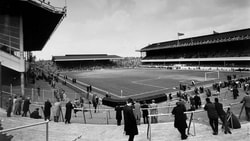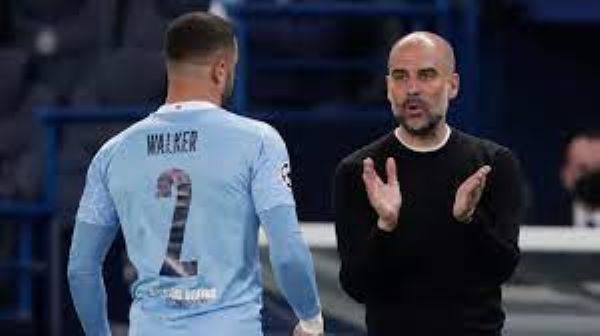|
Pep Guardiola has had a great week. Fresh from his blazing show of independence against the owners’ assault on soccer, Guardiola sent his Manchester City team into Paris on Wednesday and beat PSG, 2-1, in the first leg of the Champions League semifinal. Two goals and a victory give Man City a huge advantage going into next week’s return leg in Manchester. And the away victory just may be a karmic reward for Guardiola’ criticism of the owners’ grab for a separate, elite season-long “Super League.” “It is not sport if you cannot lose,” Guardiola said last week, when the owners announced their own closed league. The owners – including three Americans -- would have threatened old rivalries and done away with relegation and promotion, the deliciously cruel system of the European leagues. However, fans took to the barricades, many players spoke out, and even a highly successful manager, Josep Guardiola i Sala, led the voices from the sideline. Perhaps he comes by his own sense of justice through being a proud Catalan, whose family still lives in Santpedor, two hours north of Barcelona, and speaks the Catalan language in their home. Guardiola has played for Spain during his grand career as a defender but never lost sight of the Catalan goal of total independence. After winning two Champions League club titles with Barcelona, he took the challenge of raising Manchester City to something more than the subservient club in Manchester and in the Premiership in England. Guardiola is one of those soccer lifers who accumulate languages and knowledge as they move from club to club, from nation to nation – like Vincent Kompany, former Man City captain, now managing Anderlecht in his native Belgium, or Lilan Thuram, originally from Guadalupe, championship defender for France and longtime staple in Serie A of Italy, or Peter Cech, longtime keeper for the Czech Republic and Chelsea and Arsenal, who is said to speak seven languages fluently and four or five others partially. Even though the world soccer system scoops up talented children into “academies,” essentially making a college education impossible, players like these (and Roberto Baggio of Italy, I just thought about him), manage to learn and grow and often speak out against injustices. Pep Guardiola has been an admirable figure since his playing days, and it was not a total surprise that he voiced his criticism of predatory owners, who include the potentate of Man City, Sheikh Mansour bin Zayed of the United Arab Emirates. Guardiola’s idealistic stance is relevant as his club tries to win what the Man City owners would have intentionally and selfishly tried to devaluate. *** The wrapup of Man City's victory on Wednesday: https://www.bbc.com/sport/football/56880443 Guardiola's remark in context after the owners declared war on the Champions League: https://www.nytimes.com/2021/04/22/sports/soccer/super-league-soccer.html A good profile of Josep Guardiola i Sala: https://www.nytimes.com/2016/10/19/sports/soccer/pep-guardiola-manchester-city-mexico.html INFORMED ESSAY ON THE OWNERS' PLAN  The old Arsenal stadium at Highbury, in a time when everything was black and white. Later, billionaires bought into the tradition, in order to make more money, The old Arsenal stadium at Highbury, in a time when everything was black and white. Later, billionaires bought into the tradition, in order to make more money, (From GV: My friend Duncan Irving is an Arsenal fan – family members back home worked in the actual arsenal – and he has written for Soccer America and The New York Times. He now lives in Brooklyn, and tends to see soccer through a double prism, as shown in his essay here.)
By Duncan Irving As soon as the European Soccer League was announced on TV last Sunday — just as Arsenal bundled a 96th-minute equalizer over the line against relegation fodder Fulham to cement the Gunners’ position among the European Elite — I turned to my wife and said, “Well, that’ll never happen.” And thankfully, I was right. This time. Sure, I could see the appeal of a European Super League to the club bosses. The Americans at Liverpool, Man U and Arsenal have long been skittish about relegation and the revenue losses they’d incur in the highly unlikely event they went down. Why not just eliminate the risk, once and for all? After a year-long pandemic, and even longer periods of mismanagement, Barcelona and Real Madrid badly needed the cash (Spurs, too, with a spanking new state-of-the-art stadium sitting empty) and the ESL offered a healthy instant injection of funds. I’m guessing Chelsea and Manchester City, owned by an oligarch and a nation-state respectively, went along with it because they didn’t want to be left out. It wasn’t surprising that they were the first two to bail. Still it’s been hilarious to hear the EPL and UEFA work themselves into a state of high dudgeon about all this, particularly as they've employed strong-arm tactics themselves in the past. And it’s also curious to see the likes of Gary Neville and Jamie Carragher frothing indignantly away behind the very costly SkyTV paywall, a network that thinks nothing of scheduling games at the most inconvenient times, with nary a thought to the fans they purport to love so much. And when you cede the moral high ground to the likes of Jeff Bezos and Boris Johnson … you know you’ve screwed the pooch. I’ll give a little credit here to Tottenham chairman Daniel Levy, who took advantage of the astonishingly bad publicity to dump his own festering pile of bad news, Jose Mourinho, and nobody batted an eyelid. Well played, sir! I’m not sure what kinds of sanctions UEFA and the leagues can put in place, because sadly the EPL and UEFA need those clubs more than the clubs need them. Three of the four entrants in the CL semis are ESL renegades, as are two of the four in the Europa League. I’ve watched some real sludge from my Thursday night Europa League follies these past few seasons, and it’s painfully evident that they need those teams. Same with the Premier League, which chucks up an outlier — Blackburn, Leicester — maybe once a decade. They also know that fans won’t watch a diet of (pundits always toss this fixture out as an example of one to avoid) Crystal Palace vs Burnley, indefinitely. Why was I so convinced that this idea was a non-starter? Firstly, my natural pessimism as an English-born fan. Soccer is a game predicated on failure. At the end of every season, there are a handful of winners (if we’re lucky) and a whole lot of losers. And as American sports writers (notably never George) loved to tell us, there wasn’t enough scoring in soccer. As fans, we thrive in gloom culture. There’s nothing quite like the gallows humor surrounding a club when it’s performing poorly. And it’s offset by those rare occasions when everything falls into place, and with it comes the release of tension and emotion we experience when a goal is scored, or our team wins a game it really doesn’t have any business doing. The specter of relegation is something that hangs over most teams, a kind of bogeyman of failure. And also, as fans, we all love a healthy helping of Schadenfreude — who hasn’t hooted with derisive laughter at the camera focusing on the crying kid wailing into a replica jersey when their team is relegated? We’re a perverse bunch, and we like it that way. Put another, gentler, way, “It is not a sport if success is guaranteed or if it doesn’t matter when you lose.” Pep Guardiola said that on Monday. In other words, we like it just the way it is, thank you. And to be honest, the American in me (he’s been here 30-odd years and soaked in American sports so I have to listen to him once in a while) just shrugged at the prospect of a closed-shop league, while my family across the water was figuratively sharpening pitchforks and lighting torches. The fans may have won this round but I fear this is just the opening salvo in a longer, uglier battle. Florentino Perez et al (or somebody very much in their image) will be back with a larger, greedier proposal before long, with more clubs willing to take the plunge. I think the hope when the ESL was launched was that other clubs would rush to join what turned out to be a radioactive idea, and that the sheer weight of numbers would force it through. Perhaps the next time the Germans and the French will join in. Perhaps the next time, someone might think of asking the Portuguese clubs, too. As fans we’ve suffered a lot through the past 12 months — a pandemic, ghost games, fake crowd noise, a brief experiment with limited crowds (as an Arsenal fan, I was delighted to see the 2000-odd spectators lustily boo the team off the field after a 1-0 loss to Burnley), the occasional audible F-bomb, Juergen Klopp gurning on the touchline ... so it’s good that we’ve all found something we can despise together. ###
Altenir Silva
4/28/2021 06:41:22 pm
Dear George,
George
4/29/2021 08:17:23 am
Dear Altenir: Thanks for responding to Duncan's essay. You and I both agree with him that TV is a mixed blessing. I can remember back in late 80s, before I got cable TV, when I felt lucky when I got one live Serie A match every Sunday morning -- the heyday of AC MIlan with Maldini-Baresi-Donadoni--and one year George Weah and Roberto Baggio teaming up -- it could never get better than that. Now there is so much more football on TV -- but basically it's a shell game, with you getting used to one league or another, and then it vanishes into a new channel that "only" costs an extra $9 a month or whatever, I just don't pay. Maybe Serie A and Franco Baresi will come back. I'll let Duncan know you responded to his piece, In better times, he and his Missus and I meet a few times a year at a great French bistro in Brooklyn and then watch Arsenal or England's national team. Be well, GV
Altenir Silva
4/29/2021 08:58:57 am
Dear George: Comments are closed.
|
Categories
All
|










